
Albert Ayler was an American avant-garde jazz saxophonist, singer and composer.
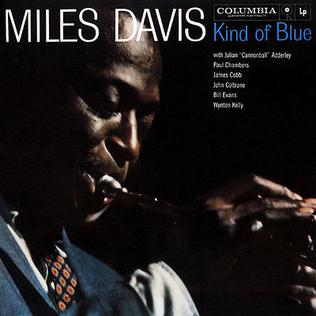
Kind of Blue is the fifth studio album released on Columbia, and twenty-eighth overall, by the American jazz musician, trumpeter, composer, and bandleader Miles Davis. It was recorded on March 2 and April 22, 1959, at Columbia's 30th Street Studio in New York City, and released on August 17 of that same year by Columbia Records. For the recording, Davis led a sextet featuring saxophonists John Coltrane and Julian "Cannonball" Adderley, pianist Bill Evans, bassist Paul Chambers, and drummer Jimmy Cobb, with new band pianist Wynton Kelly appearing on one track – "Freddie Freeloader" – in place of Evans.

Cornelius "Sonny" Fortune was an American jazz saxophonist. He played soprano, alto, tenor, and baritone saxophones, clarinet, and flute.
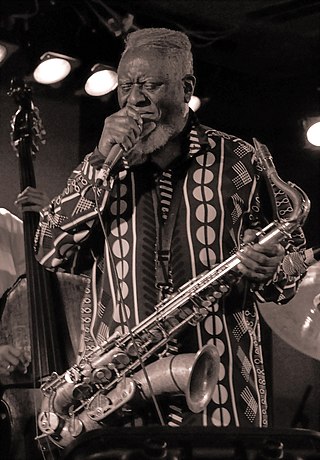
Pharoah Sanders was an American jazz saxophonist. Known for his overblowing, harmonic, and multiphonic techniques on the saxophone, as well as his use of "sheets of sound", Sanders played a prominent role in the development of free jazz and spiritual jazz through his work as a member of John Coltrane's groups in the mid-1960s, and later through his solo work. He released more than thirty albums as a leader and collaborated extensively with vocalist Leon Thomas and pianist Alice Coltrane, among many others. Fellow saxophonist Ornette Coleman once described him as "probably the best tenor player in the world".

James Emory Garrison was an American jazz double bassist. He is best remembered for his association with John Coltrane from 1961 to 1967.

Transition is an album of music by jazz saxophonist John Coltrane, recorded in 1965 but released posthumously only in 1970. As its title indicates, Transition was a bridge between classic quartet recordings like A Love Supreme and the more experimental works of Coltrane's last years.
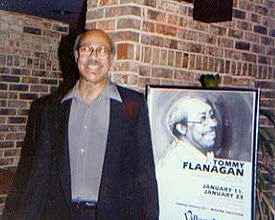
Thomas Lee Flanagan was an American jazz pianist and composer. He grew up in Detroit, initially influenced by such pianists as Art Tatum, Teddy Wilson, and Nat King Cole, and then by bebop musicians. Within months of moving to New York in 1956, he had recorded with Miles Davis and on Sonny Rollins' album Saxophone Colossus. Recordings under various leaders, including Giant Steps of John Coltrane, continued well into 1962, when he became vocalist Ella Fitzgerald's full-time accompanist. He worked with Fitzgerald for three years until 1965, and then in 1968 returned to be her pianist and musical director, this time for a decade.

Ascension is a jazz album by John Coltrane recorded in June 1965 and released in 1966. It is considered a watershed in Coltrane's work, with the albums recorded before it being more conventional in structure and the albums recorded after it being looser, free jazz inspired works. In addition, it signaled Coltrane's interest in moving away from the quartet format. AllMusic called it "the single recording that placed John Coltrane firmly into the avant-garde".
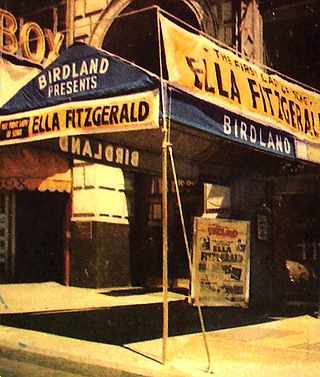
Birdland is a jazz club started in New York City on December 15, 1949. The original Birdland, which was located at 1678 Broadway, just north of West 52nd Street in Manhattan, was closed in 1965 due to increased rents, but it re-opened for one night in 1979. A revival began in 1986 with the opening of the second nightclub by the same name that is now located in Manhattan's Theater District, not far from the original nightclub's location. The current location is in the same building as the previous headquarters of The New York Observer.

Mating Call is a studio album by jazz musician Tadd Dameron with saxophonist John Coltrane, issued in early 1957 on Prestige Records. It was recorded at the studio of Rudy Van Gelder in Hackensack, New Jersey.

The Cats is an album by jazz pianist Tommy Flanagan recorded on April 18, 1957 and released in December 1959 on New Jazz, a subsidiary label of Prestige Records. It is credited to Flanagan, saxophonist John Coltrane, guitarist Kenny Burrell, and trumpeter Idrees Sulieman. It was issued after Coltrane's Prestige contract had ended.
Sphere was an American jazz band which began as a tribute to pianist Thelonious Monk, whose middle name was "Sphere".
The Bob Thiele Collective was an "all-star" American jazz ensemble which recorded three albums for Bob Thiele's record label Red Baron. Thiele assembled and produced the three different groups.
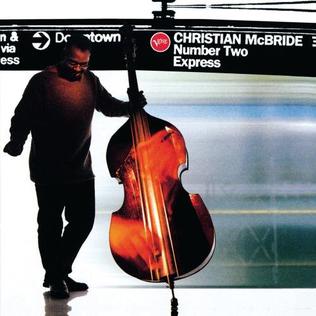
Number Two Express is the second studio album by the American jazz bassist Christian McBride. It was recorded in 1995 and released by Verve Records the following year. The album peaked at #23 in the Billboard Jazz Albums chart.
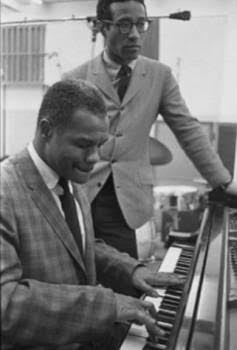
Hasaan Ibn Ali was an American jazz pianist and composer.

Benjamin Alexander Riley Jr. was an American jazz drummer known for his work with Thelonious Monk, as well as Alice Coltrane, Stan Getz, Eddie "Lockjaw" Davis, Ahmad Jamal, and as a member of the group Sphere. During the 1970s and 1980s he was a member of the New York Jazz Quartet.

Confirmation is a live album by pianists Kenny Barron and Barry Harris recorded as part of the 7th Annual Riverside Park Arts Festival in 1991 and released on the Candid label.

Sphere is an album by the American jazz group Sphere. It was recorded on October 4, 1997, in New York City and New Jersey, and was released in 1998 by Verve. The album features saxophonist Gary Bartz, replacing original band member Charlie Rouse, who died in 1988, pianist Kenny Barron, bassist Buster Williams, and drummer Ben Riley. Sphere was the group's first album since 1988's Bird Songs.

The Red and Orange Poems is an album by the American saxophonist Gary Bartz, released in 1994. It was considered a comeback album. Bartz supported the album with a North American tour.
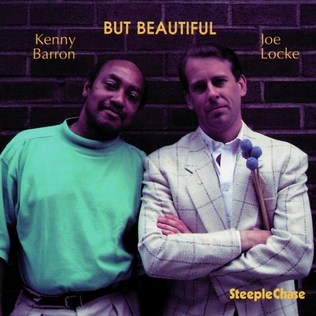
But Beautiful is an album of duets by pianist Kenny Barron and vibraphonist Joe Locke. It was recorded during August 1991, and was released later that year by SteepleChase Records. According to Locke, the musicians' goal was to create an album of instrumental ballads while maintaining "a vocal quality in the music."


















